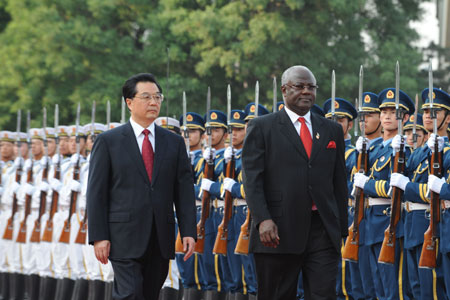Chinese President Hu Jintao held talks with his Sierra Leone counterpart Ernest Bai Koroma in Beijing Monday, both agreeing to push the bilateral friendly and cooperative ties to a new height.
 |
|
Chinese President Hu Jintao (L) holds a welcoming ceremony for his Sierra Leone counterpart Ernest Bai Koroma in Beijing, capital of China, May 25, 2009. [Xinhua] |
Hu gave Koroma a red-carpet welcome, including a 21-gun salute and parade, at the Great Hall of the People. He started their talks by congratulating the Sierra Leone and African people on the 46th anniversary of Africa Day, a festival to celebrate the founding of the Organization of African Unity, which was succeeded by the African Union in 2002.
Hailing the traditional friendly exchanges between the two peoples and ruling parties, Hu said "the Chinese people would never forget the two countries' forging diplomatic ties in the 1970s, nor would they forget the precious support Sierra Leone offered for the restoration of China's legitimate seat in the United Nations."
He expected Koroma's current trip to further step up traditional friendship and facilitate cooperation.
Koroma said his country was grateful to the selfless assistance China offered over the years, adding the one-China policy is a cornerstone of Sierra Leone's China policy.
Taiwan and Tibet, both historically and geographically, are inalienable parts of the People's Republic of China, he added.
Calling the two countries "good friends and partners", Hu said the China-Sierra Leone traditional friendship remains unchanged despite the turbulence of international situations.
Hu said President Koroma highly treasures bilateral ties and firmly sticks to the one-China policy. Bilateral relations have shown a sound momentum of accelerated growth since President Koroma took his office.
The two heads of state agreed to explore cooperation in the areas of infrastructure construction and resource exploitation.
To boost bilateral ties, Hu proposed to keep close contacts among the two countries' leaders, maintain friendly exchanges between lawmaking organs and ruling parties, and make joint efforts to facilitate bilateral education, public health and human resources programs.
He told Koroma China values its trade ties with Sierra Leon, and is committed to helping speed up the country's economic reconstruction.
Hu welcomed more Sierra Leone young people to study in China, pledging to foster more professionals for the country.
China had offered scholarship to altogether 311 Sierra Leone students since 1976.
Hu also vowed to promote the accomplishment of existing bilateral projects as scheduled, offer aid to Sierra Leone's education, culture, public health programs, and enhance coordination with it on major issues including peacekeeping, poverty reduction and fighting against global challenges.
Koroma said his country welcomed increased investment from China to aid his country's economy, vowing to create sound environment and conditions.
"Sierra Leone highly values relations with China, and is ready to cement all-round cooperation with the country and learn from its development experience," he said.
Koroma called on enhanced bilateral cooperation on international and regional issues, in particular African issues, to further push forward Sierra Leone-China and Africa-China ties.
The two presidents attended a signing ceremony for three cooperative agreements including one on China's providing anti-malaria medicines to Sierra Leone.
The West African country, once British colony, gained independence in 1961 and founded the Republic of Sierra Leone. With a population of over 6.1 million and an area of some 71,740 square kilometers, the country is the lowest ranked country on the Human Development Index and seventh lowest on the Human Poverty Index, following years of civil wars.
China forged diplomatic ties with Sierra Leone on July 29, 1971. Between that date and this March, China had invested 33.9 million U.S. dollars in the country and helped build more than 30 projects including hydropower stations, a national stadium, hospitals and government buildings.
Sierra Leone rolled out its first CDMA network in the country last month with help from Chinese equipment vendor Huawei Technologies. Sierratel, the country's government-owned telecommunication company, received a delivery of 16.6 million U.S. dollars worth of wireless telecommunication equipment from Huawei, funded by the Chinese government's preferential loan.
Chinese ambassador to Sierra Leone Qiu Shaofang said China would build two hydropower dams in Sierra Leone in the next three years.
"China has offered long-term economic aid to Sierra Leone and has promised not to reduce assistance in spite of the global slump," said Qiu.
Bilateral trade topped 83.71 million U.S. dollars last year, up 30.4 percent year on year. With the global downturn, total bilateral trade in the first four months of the year was down 40 percent to 12 million U.S. dollars.
China mainly exports machinery and electrical products, textiles and chemical products to Sierra Leone, while imports logs, natural rubber and coco beans.
Koroma's ongoing China trip will also take him to central China's Hunan Province and the country's financial hub Shanghai.
(Xinhua News Agency May 26, 2009)